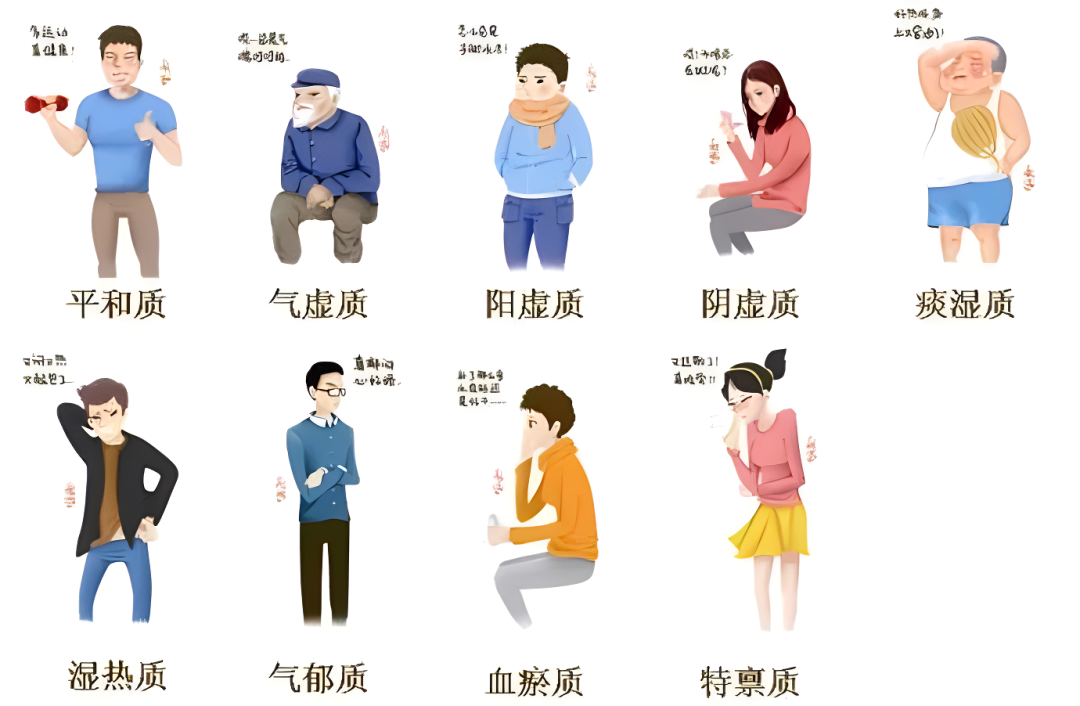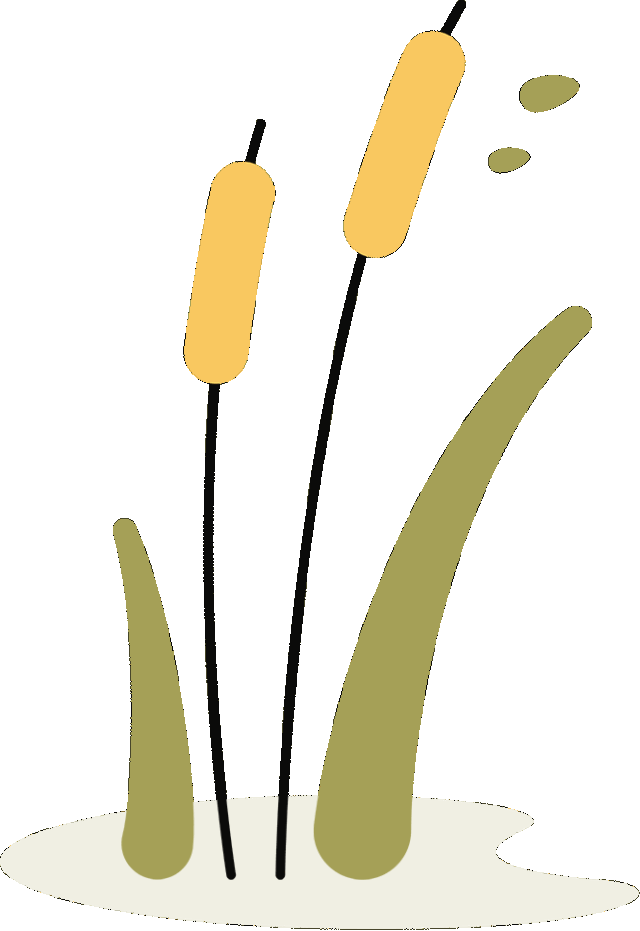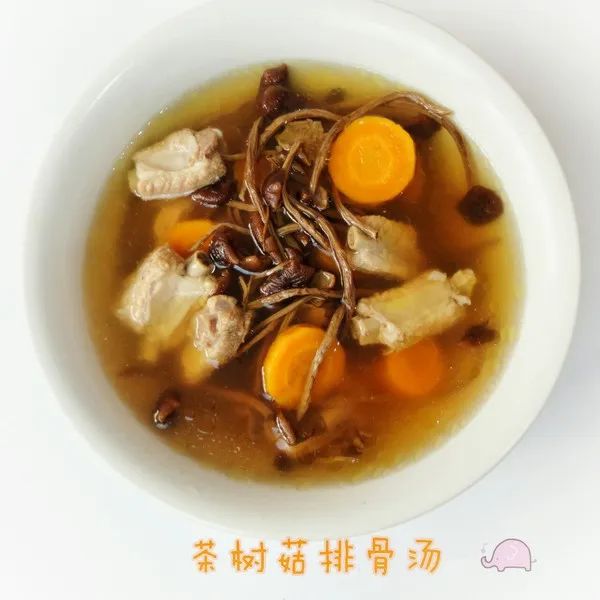 Click the blue text above to follow us
Click the blue text above to follow us

Medical Guidance:
Dr. Song Yuhong, Deputy Director of the TCM Department at Guangzhou First People’s Hospital, welcomes you to continue following us.
Each person inherits different genetic traits from their parents and has different living environments, making them a unique individual. Therefore, each person’s constitution varies. Traditional Chinese Medicine (TCM) categorizes constitutions into nine types: Pinghe Tizhi (Harmonious Constitution), Yang Xu Tizhi (Yang Deficiency Constitution), Yin Xu Tizhi (Yin Deficiency Constitution), Tan Shi Tizhi (Phlegm-Damp Constitution), Shi Re Tizhi (Damp-Heat Constitution), Qi Yu Tizhi (Qi Stagnation Constitution), Qi Xu Tizhi (Qi Deficiency Constitution), Xue Yu Tizhi (Blood Stasis Constitution), and Te Bing Tizhi (Special Constitution). Apart from the Harmonious Constitution, the other eight are considered imbalanced constitutions, which are the basis and root of various diseases.

The human constitution has both stability and variability. Through health regulation in daily life, we can improve the imbalanced states of various constitutions and restore health. The Harmonious Constitution is the most common type and represents the largest group of individuals. Let us explore the characteristics and daily health maintenance of the Harmonious Constitution.

Common Characteristics
Individuals with a Harmonious Constitution typically have a well-proportioned and robust physique, a rosy complexion, healthy skin, thick and shiny hair, bright eyes, a clear nose, good sense of smell, rosy lips, low fatigue levels, abundant energy, tolerance to cold and heat, no dull complexion or numbness/pain in limbs, good sleep, normal appetite, regular bowel movements, a light red tongue, thin white coating, and a soft, strong pulse.
They are generally easy-going and cheerful, with a strong adaptability to both natural and social environments, and they tend to experience fewer illnesses.


Lifestyle Regulation
Adapt daily activities to the four seasons and the principles of Yin and Yang, balance work and rest, and engage in moderate exercise; maintain a cheerful and optimistic mindset, and achieve psychological balance.

Dietary Regulation
Avoid overeating or undereating, and avoid extremes of cold and heat. Consume more whole grains, vegetables, and fruits, while minimizing greasy and spicy foods. Regularly include the following foods to nourish the stomach and strengthen the spleen, maintaining a harmonious and light body.

Tea Tree Mushroom and Pork Rib Soup

【Ingredients】
250g pork ribs, 30g tea tree mushrooms, half a carrot, 4 slices of ginger, salt to taste.
【Preparation】
Cut the pork ribs into pieces and wash them. Soak the tea tree mushrooms for half an hour. Peel and cut the carrot into chunks, and prepare the ginger slices. Boil water in a pot, blanch the pork ribs, and then wash off the surface foam. Place the pork ribs, tea tree mushrooms, carrot, and ginger slices into a clay pot, adding an appropriate amount of water. Bring to a boil over high heat, then simmer on low heat for 1 hour, adding salt to taste before serving.
【Effects】
Tea tree mushrooms have the effect of strengthening the spleen and stopping diarrhea, and they possess special properties for anti-aging, lowering cholesterol, and cancer prevention and treatment.

Pork Bone and Yam Soup

【Ingredients】
Appropriate amount of pork spine, appropriate amount of yam, appropriate amount of tender corn, appropriate amount of cinnamon, appropriate amount of ginger, appropriate amount of bay leaves, appropriate amount of goji berries, and salt to taste.
【Preparation】
Clean the pork spine and cut it into small pieces. Blanch the pork spine to remove blood foam, then set aside. Add enough water to a clay pot, place in the pork spine, ginger slices, cinnamon, and bay leaves, bring to a boil over high heat, then reduce to low heat to simmer. Cut the tender corn into small pieces, add to the pot after 30 minutes, and continue to simmer on low heat. Peel the yam, cut into chunks, add to the pot with goji berries, and season with salt, cooking for another 10 minutes.
【Effects】
Yam has the effects of tonifying the spleen and stomach, nourishing the lungs, and benefiting the kidneys, making it suitable for those with a Harmonious Constitution.

Job’s Tears and Yam Porridge

【Ingredients】
60g Job’s tears, 100g fresh yam, 60g rice, and sugar to taste.
【Preparation】
First, wash the rice and Job’s tears separately; peel and wash the fresh yam, cutting it into small pieces, and soak in water. Place the rice and Job’s tears in a pot with water, bring to a boil over high heat, then reduce to low heat and simmer for 10 minutes. Add the fresh yam and sugar, continuing to simmer until it becomes porridge.
【Effects】
Job’s tears are neutral and sweet, strengthening the spleen and promoting urination; fresh yam is neutral and sweet, benefiting Qi and nourishing Yin, strengthening the spleen and dispelling dampness.
Written by: Song Yuhong
Profile:
Song Yuhong
Guangzhou
First People’s Hospital
Deputy Director of the TCM Department
Medical Doctor
Chief Physician

Renowned TCM physician in Guangzhou, high-level talent in Guangzhou, graduate advisor at Guangzhou Medical University, peer reviewer for the National Natural Science Foundation projects, and evaluation expert for the Ministry of Education’s Degree and Graduate Education Development Center. Youth member of the Comprehensive Hospital TCM Work Committee of the Chinese Association of Traditional Chinese Medicine, standing committee member of the Gastroenterology Management Branch of the Guangdong Medical Industry Association, and standing committee member of the Portal Hypertension Management Branch of the Guangdong Medical Industry Association, among other academic positions. Academic successor of Professor Lü Zhiping, a national renowned TCM physician, engaged in clinical work in integrated Chinese and Western medicine for many years, specializing in the integrated diagnosis and treatment of chronic diseases, particularly diabetes, metabolic disorders, and cardiovascular diseases.
Consultation Time:Every Tuesday afternoon.
END

Edited by: Guangdong Easy Life
Cheng Qi, Liang Yingxin
Editor: Ma Jun, Zhang Yanhong
Follow us
For more health information

Hospital Address: No. 1 Panfu Road, Yuexiu District, Guangzhou.

